In 1975, at the end of a commencement speech Muhammad Ali was giving at Harvard University, a student shouted: “Give us a poem!” Ali didn’t miss a beat, responding: “Me? We!” The crowd ate it up.
Ali was invited to give that speech. He had something that Harvard wanted. Politicians have it the other way around — at least when they’re starting out. Politicians by definition are required to talk about themselves — because they’re asking for your vote. They’re asking for you to make a personal decision to support them as an individual.
It’s a very hard thing to do when you think about it. If you’re going out on a date, if you have a brain in your head, you’re not going to drone on incessantly about yourself. Even if you are truly spectacular, no one wants to hear you bragging about it or describing it in detail.
If you’re in sales, naturally you need to talk up the appeal or competitive advantages of the product you’re promoting. But if that’s all you talk about, and you show zero interest in your potential customer and their needs and wants, you’ll close fewer deals. It’s axiomatic.
Similarly, political candidates who truly listen to their potential voters get a better feel for what they actually want and need. But that’s just a start. The ones who do well in campaigns reflect those needs and wants back to the voter. They make it about the voter. They make it about us. All of us, together. We.
About thirty years after Ali voiced that shortest poem that had ever been spoken, Barack Obama cut a TV ad for his U.S. Senate campaign inside a neighbor’s house. At the end of the script, he was supposed to look at the camera and say: “Yes we can.”
It almost didn’t happen. He said to his media guru, David Axelrod: “Doesn’t that sound a little corny?” Axe looked toward Michelle Obama, seated on the stairs, and asked what she thought. Michelle shook her head and said: “Not corny.”
That was enough for the State Senator. He said it — and then went on to say it again and again as he won the Senate seat and two presidential terms. When Obama gave his farewell presidential speech in 2017 in Chicago’s McCormick Place Convention Center, he was still talking about the “we”:
“I am asking you to believe. Not in my ability to bring about change — but in yours. I am asking you to hold fast to that faith written into our founding documents; that idea whispered by slaves and abolitionists; that spirit sung by immigrants and homesteaders and those who marched for justice; that creed reaffirmed by those who planted flags from foreign battlefields to the surface of the moon; a creed at the core of every American whose story is not yet written:
Yes, we can. Yes, we did. Yes, we can.”
The funny thing is that Obama kind of borrowed the term from legendary labor leader Cesar Chavez who was famous for the phrase “Si, se puede” (“yes, it can be done”). Chavez and Dolores Huerta, cofounders of the United Farm Workers Association, didn’t mind.
It’s a good thing for any politician to make it about the “we,” but even more so for those candidates who are running for president. They are ultimately trying to appeal to every voter, or at the very least, to all party loyalists and whatever number of swing votes are up for grabs in that political moment.
Think about the political catchphrases that we remember from American political history — regardless of the candidate’s ideology. “We have nothing to fear, but fear itself.” “Ask not what your country can do for you — ask what you can do for your country.” “Government is not the solution to our problem, government is our problem.”
Even RFK didn’t hit his political stride until he experienced American poverty up close and personal during his visits to schoolhouses in Eastern Kentucky. Once he did, people could feel the sincerity in his voice when he talked about fighting for them. He was no longer just Jack’s brother.
Is Trump the exception? Not really. While he talks about himself more than any political candidate in U.S. history, he also makes his voters feel seen and heard. Whether he’s making references to “the deplorables” or “the forgotten” — they feel that they are part of something bigger than themselves. And that’s what politics is all about.
The best contemporary example of the “we” strategy is Bernie Sanders. He’s an independent senator from a tiny state of 630,000 people — and he’s constantly yelling. But he inspires like no other candidate in the Democratic field — which once consisted of 25 candidates. Sanders is always defining what he wants to do for the people. Us. And he repeatedly explains that even if he’s elected, “we need a political revolution!” Again, he makes people feel like they are part of something larger than just backing an individual He inspires. The clearest example of this can be seen in the web ad “Together” that his campaign that ran four years ago. His message is still the same.
It’s a tough balance, to be sure. When you’re beseeching people to decide that you are the one to lead the free world, it’s mandatory to communicate a track record that reflects qualifications that prepare you for the job (or at least that’s traditionally been a requirement). But that’s still just a minimum.
If the message is constantly about you — and not the millions you seek to represent — it makes the climb to the nomination and then the White House a whole lot steeper.


